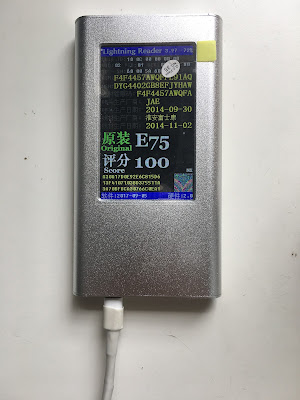I’m sure you’ve seen a fake lightning cable before, and differentiating between fake and authentic seem pretty straightforward. Even Apple’s website shows you how to tell.
But.. I’ve noticed that the fakes are looking increasingly like the authentic ones. So how can you tell?
The easy to tell ones
These are the basic ones. The lightning connector is not in a single metal casing. These are pretty straightforward to differentiate. |
| These are the basic ones. The lightning connector is not in a single metal casing. These are pretty straightforward to tell. |
Looking at the above picture, it seems pretty easy to tell eh? But nah, that's just the tip of the iceberg.
I’m starting to see some with a single metal piece that almost seems authentic until you look very closely.
Not so easy to tell ones
There was once I bought an ‘authentic’ cable from someone on Carousell. The box looked identical to the ones in Apple stores, with the exception of the blue sticker on the corner, saying it’s original in Chinese. I then became a little skeptical about its authenticity. I then noticed that the connector became slightly warm when charging. The last thing that gave it away was the documentation(photos below). That’s when I knew it definitely wasn’t original. Luckily, I was able to get a refund. Below are some photos for comparison. |
| Packaging looks identical with the exception of the blue sticker |
 |
| See the subtle differences between the fake and the real? The real one is on the right. |
 |
| USB connector looks pretty much the same. Apple's official guide doesn't seem really useful.. |
 |
| Notice anything odd? Box says 'Lighting to USB Cable', documentation says 'Lightning to 30-pin Adapter'. Hmm... seems odd, doesn't it? |
There are still some differences in this case, mainly the lightning connector. The fake seems to have more jagged edges.
I then started seeing lightning cables that looked identical to the original ones. Out of curiosity I cut open the connector. What I found was not what other people’s teardown of the Lightning connector.
I then chanced upon this picture:
 |
| Chinese counterfeit lightning cable types? |
On the top left, it seems like the original lightning connector. I was getting convinced that I found the original one. So I started purchasing a few of these to sell, thinking it was original. (which I later found out wasn't)
 |
| Looks very convincing. |
 |
| Looks exactly the same! |
 |
| Took the connector apart. Doesn't seem original to me. However the connector(area with the 8 pins) look exactly like the original one. |
It claims to be able to tell if a cable is authentic by just plugging it in. Since I wasn’t 100% sure what I got was original, I bought it just to be sure.
What I found out with that device is shocking. Even though some can look exactly like the real deal, it registered as a fake on the device.
 |
| Copycat means fake btw. |
 |
| Look at the lightning connector. Looks like what you get from an iPhone box, but its fake |
 |
| Cable that came in an iPhone box. Wires are showing so I placed a layer of heat shrink over the cable. |
 |
| Foxconn packaging. Real? No. Fake. They even managed to program the cable serial number into the connector! |
So, how can you tell if what you’ve got is authentic?
The conclusion I got from my experience is that you can only tell if you have the device I have.
I'm sure not many of you reading this would be crazy enough to buy a device costing nearly 10x of a lightning cable in the Apple Store to figure this out.
However, if you're in Singapore, you can hmu via Carousell and you can pay me a small fee to test some cables.
After all, I have to recoup some of the costs of this device right? 😅
Else, what you can do, without the device, is to only look at the connector and make sure the corners are smooth and they look exactly like the original one.
To ensure your cable is an original one, purchase it from the Apple store or only buy MFi Certified cables from reputable brands like Targus and Belkin etc. Make sure the packaging has the MFi Certified logo, where it shows 'made for iPod, iPhone, iPad'.
This would hopefully help prevent you from getting scammed when someone, in a 3rd party repair store for example, tries to sell you a cable that looks exactly like an original one.
Using a fake cable bypasses some protection from the cable and could harm your device. Do check out this video by iPad Rehab I found, for a more detailed explanation.
You may also want to check out this video by mobilereviewseh on the topic of lightning cables.
Else, what you can do, without the device, is to only look at the connector and make sure the corners are smooth and they look exactly like the original one.
To ensure your cable is an original one, purchase it from the Apple store or only buy MFi Certified cables from reputable brands like Targus and Belkin etc. Make sure the packaging has the MFi Certified logo, where it shows 'made for iPod, iPhone, iPad'.
Using a fake cable bypasses some protection from the cable and could harm your device. Do check out this video by iPad Rehab I found, for a more detailed explanation.
You may also want to check out this video by mobilereviewseh on the topic of lightning cables.
